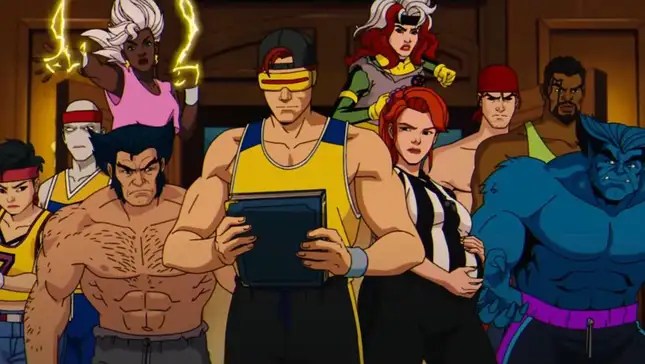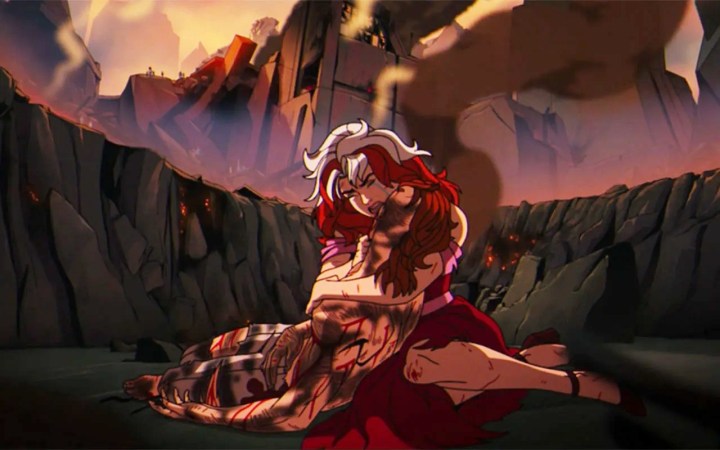X-Men ’97 exhibits that Marvel and the MCU are transferring in the correct route


This spring, there have been three streaming collection which have damaged via the popular culture muddle and grow to be “water cooler shows” — exhibits which might be mentioned obsessively throughout social media platforms like X and TikTok and, sure, even the final remaining water coolers left in places of work internationally. The first two — Shōgun and Baby Reindeer — had been gentle surprises; in any case, what number of historic epics set in feudal Japan and exhibits about male sexual trauma have topped the Nielsen viewing charts?
But the third widespread water cooler present of spring 2024 is probably probably the most shocking: X-Men ’97, a revival of a beloved Nineties animated collection that had mixed-to-negative press earlier than its premiere on March 20. What may the present be however one more simple try to money in on Gen-X nostalgia? The just lately canceled reboot of Willow, plus the countless stream of more and more mediocre live-action remakes of recent Disney animated classics like Aladdin and The Little Mermaid, set the bar fairly low, and with it, viewers’ expectations.
But like its namesake comics, X-Men ’97 proved to be, effectively, uncanny, wonderful, and, sure, astonishing: a considerate, dynamic, complicated, and enjoyable tackle a property that had aged fairly terribly over the a long time. Its success, each with critics and with its more and more engaged viewers, indicators not solely a uncommon win for the beleaguered franchise but in addition factors to a special, extra considerate strategy to the MCU. It additionally holds the promise that the chief architects behind Marvel’s huge cinematic universe have realized from their latest errors and have charted a brand new course for fulfillment with its subsequent phases.
Why X-Men ’97 works (and why latest MCU films haven’t)

It’s not a stunning assertion to assert that reboots are sometimes lazy and never vey good, however X-Men ’97 works as a result of it acknowledges the enchantment of the unique present, X-Men: The Animated Series, and up to date it with a contemporary storytelling sensibility. When it debuted in 1992, X-Men: The Animated Series turned an on the spot hit with kids and a few grownup comedian followers as a result of it synthesized 30 years of story into one simply digestible bundle. Furthermore, the visuals had been brilliant and colourful, the voice appearing distinctive and soulful (let’s all give a shout out to Alison Sealy-Smith and Lenore Zahn, who supplied the voice and soul to Storm and Rogue, respectively), and the then-current costumes and appears created by Jim Lee and Marc Silvestri within the comics had been widespread sufficient to win over the devoted and the neophytes alike.
Sounds easy, proper? But it’s trickier than you would possibly suppose, particularly with a property like this one, which has its legion of followers who’ve rose-colored recollections of the present that outlined their youth. A latest re-watch jogged my memory that X-Men: The Animated Series, whereas nonetheless efficient and intermittently entertaining, was additionally hopelessly outdated: the animation was janky, particularly within the later seasons, some storylines had been smashed along with no rhyme or motive, and a number of the characterizations, particularly Jean Grey’s, had been borderline offensive.
X-Men ’97 corrects these errors whereas nonetheless honoring what made its mother or father collection so highly effective to a era of viewers. Jean isn’t a whiny feminine caricature who continually faints when she’s overwhelmed; as an alternative, she’s robust when she must be, and introspective when the plot permits her to be. Ditto for Storm and Rogue; within the first 5 episodes alone, these three characters show extra depth than all of The Marvels, which pressured its feminine hero triptych down audiences’ throats with barely-there characterizations and weak makes an attempt at bonding.
In X-Men ’97, there’s a real sense of household shared between not simply these characters however the whole X-Men squad, and that’s essential to the enchantment of the whole X-franchise. It’s not nearly one hero, or two, or three; as an alternative, it’s about dozens, and typically even a whole bunch, of characters which have distinctive powers and, extra importantly, totally different personalities.

And in contrast to the Fox X-Men movies, and plenty of animated adaptions since, Wolverine isn’t the lead character in X-Men ’97 (he’s barely in it). There is no lead within the X-Men, save for the idea of Xavier’s dream and the notion of a discovered household sticking collectively when the percentages are stacked in opposition to them. For Marvel to acknowledge this now, after a long time of mishandling from different studios, is a blessing and a promise; it suggests the studio is aware of tips on how to use the fundamental enchantment of X-Men and apply it for a contemporary viewers.
X-Men ’97 takes huge swings … and succeeds

Another facet of X-Men ’97 I believe is essential to understanding why it’s so profitable, and the way nice Marvel is at dealing with the property proper now, is its willingness to take huge, dangerous narrative swings. In simply its second episode, the present de-powered one if its hottest characters, Storm, and sidelined her till the season-ending story arc. The third episode weaved collectively more and more complicated storylines from the previous like Inferno and Cable’s origin to create a genuinely touching 25 minutes addressing themes of motherhood, parental sacrifice, and cut up personalities.
Last, however actually not least, the fifth episode dropped a nuclear bomb by itself present within the type of an Omega Sentinel, an enormous robotic that slaughtered numerous mutants, together with wide-eyed harmless Leech, main X-villain Sebastian Shaw, and, maybe most surprisingly and devastatingly of all, fan-favorite Gambit, who shuffled off this mortal coil defending the lady he cherished.

X-Men ’97 didn’t need to go that onerous, however it did, and that’s why it was so efficient. Its breakneck pacing and refusal to essentially decelerate stored you tuned in to see what would occur subsequent. The bulk of the credit score goes to the present’s creator and head author, Beau DeMayo, and his supervising director, Jake Castorena, each of whom knew intuitively that to make individuals care about these characters, and the present itself, is to interrupt their hearts. After that fifth episode, titled Remember It, fans flocked to social media to register their surprise and trauma. The present went there; it pulled no punches, and if Gambit will be killed off, nobody was secure, not even a Cajun himbo with a penchant for hot-pink crop tops.

This is precisely what the MCU must reinvigorate its flagging multiverse: huge inventive dangers that make sense. That’s why Avengers: Endgame labored so effectively. What may’ve been a large number of a film, crammed with countless cameos and dangling plot threads from almost two-dozen films, was as an alternative a cohesive film that produced a real cultural second, and a becoming finish to the Infinity Saga.
Iron Man died a heroic demise, the promise of Captain Marvel as a deus ex machina was fulfilled, and Black Widow and Steve Rogers each had their storylines come to a logical finish. It additionally arrange intriguing new storylines, from Scarlet Witch’s seek for that means after her devastating loss to Thor’s quest for a brand new residence, that hinted on the subsequent part in Marvel’s evolution.
What this implies for the MCU transferring ahead

Of course, everyone knows now how effectively that went. For each success like WandaVision, which stays the most effective factor Marvel made for Disney+, there have been a variety of disappointments, like Thor: Love and Thunder and Secret Invasion. Even the successes like Black Panther: Wakanda Forever and Guardians of the Galaxy Vol. 3 had been bittersweet, as they felt like endings or wakes to previous glories. Too a lot time and vitality was dedicated to forcing characters (Ironheart, Agatha Harkness) and storylines (Kang taking up the multiverse) no one actually wished. The outcome was a disastrous 2023, with Ant-Man and the Wasp: Quantumania exhausting even probably the most die-hard Marvel fan, and The Marvels being outright rejected by just about everybody, changing into the biggest box office bomb in Disney’s history.
Even although it’s in a roundabout way tied to the MCU, X-Men ’97 exhibits the brand new inventive route Marvel is taking that’s eschewing reliving previous triumphs and constructing new franchises that showcase what makes them so interesting within the first place. For the X-Men, it’s embracing its insane cleaning soap opera storylines with open arms and juggling a stacked roster of characters which might be all related by a transparent and customary objective: the combat for mutants to be accepted by humanity that fears or loathes them. X-Men ’97 immerses you right into a world crammed with intrigue and hazard, the place you possibly can meet a buddy one minute and battle a foe the subsequent, and it’s not content material to play it secure.
That’s precisely why the X-Men comics had been so widespread from the ’70s and ’80s to the current, particularly when Chris Claremont was steering the ship. Beloved characters can and can die, new ones shall be launched to take their very own place within the homo superior pantheon, and the principle narrative will take some turns you gained’t see coming.

You can inform Marvel can also be making use of this technique to a different key property that Disney acquired from twentieth Century Fox: the Fantastic Four. It hasn’t began filming but, however its satisfying inventive choices, from Vanessa Kirby’s comic-accurate casting as Sue Storm to the outside-the-box inclusion of Ralph Ineson, John Malkovich, and Paul Walter Hauser as, respectively, Galactus and (possibly?) Puppet Master and Mole Man are indicators Marvel is aware of what works for the FF: out-there ’60s silliness and Kennedy-era sci-fi.
Even the promo picture they used to introduce its fundamental case was charming retro, and indicative of a brand new strategy by the studio, one which absolutely embraced the harmless enchantment of the subsequent huge property it was establishing.

X-Men ’97 is already one of Disney+’s most-watched shows this year, and its stature will proceed to develop as extra individuals uncover it. By itself, the present is a powerful achievement, using the animated kind to ship one thing each acquainted and new. But its final significance maybe lies in what it’s pointing to: a revitalized MCU that’s set to ship what followers need, reasonably than what the studio thinks they want. Only time will inform if X-Men ’97 actually is a harbinger of higher issues to come back, or an remoted blip on in any other case unenthusiastic slate filled with sequels and spinoffs nobody actually needs.
You can stream all 10 episodes of X-Men ’97 season 1 now on Disney+.











